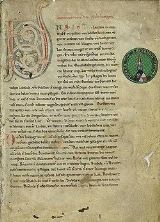
Nibelungenlied
Overview
Epic poetry
An epic is a lengthy narrative poem, ordinarily concerning a serious subject containing details of heroic deeds and events significant to a culture or nation. Oral poetry may qualify as an epic, and Albert Lord and Milman Parry have argued that classical epics were fundamentally an oral poetic form...
in Middle High German
Middle High German
Middle High German , abbreviated MHG , is the term used for the period in the history of the German language between 1050 and 1350. It is preceded by Old High German and followed by Early New High German...
. The story tells of dragon
Dragon
A dragon is a legendary creature, typically with serpentine or reptilian traits, that feature in the myths of many cultures. There are two distinct cultural traditions of dragons: the European dragon, derived from European folk traditions and ultimately related to Greek and Middle Eastern...
-slayer Siegfried
Sigurd
Sigurd is a legendary hero of Norse mythology, as well as the central character in the Völsunga saga. The earliest extant representations for his legend come in pictorial form from seven runestones in Sweden and most notably the Ramsund carving Sigurd (Old Norse: Sigurðr) is a legendary hero of...
at the court of the Burgundians
Burgundians
The Burgundians were an East Germanic tribe which may have emigrated from mainland Scandinavia to the island of Bornholm, whose old form in Old Norse still was Burgundarholmr , and from there to mainland Europe...
, how he was murdered, and of his wife Kriemhild
Gudrun
Gudrun is a major figure in the early Germanic literature centered on the hero Sigurd, son of Sigmund. She appears as Kriemhild in the Nibelungenlied and as Gutrune in Wagner's Der Ring des Nibelungen.-Norse mythology:...
's revenge.
The Nibelungenlied is based on pre-Christian Germanic
Germanic paganism
Germanic paganism refers to the theology and religious practices of the Germanic peoples of north-western Europe from the Iron Age until their Christianization during the Medieval period...
heroic motifs (the "Nibelungensaga"), which include oral traditions and reports based on historic events and individuals of the 5th and 6th centuries.
Unanswered Questions

